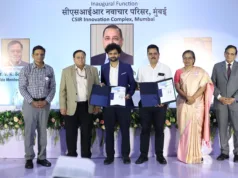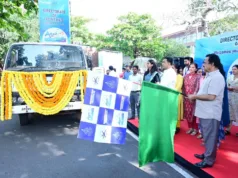The Council of Scientific and Industrial Research – National Institute of Oceanography (CSIR-NIO) has successfully transferred its groundbreaking microbial consortia technology to MSortia LLP, a faculty startup of Cochin University of Science and Technology, Kochi, Kerala. This strategic collaboration marks a significant advancement in sustainable aquaculture practices.
The microbial consortia technology, developed by CSIR-NIO, addresses a critical challenge in aquaculture by providing an effective solution for wastewater treatment, thereby protecting the health of cultivated aquatic animals. This innovative technology leverages marine bacteria isolated from diverse ecosystems to revolutionise water quality management in aquaculture operations. Developed through CSIR-NIO’s research programs, the technology aims to translate scientific findings into practical applications beneficial to society.
The technology transfer agreement was signed on June 24, 2024, by Prof. Sunil Kumar Singh, Director of CSIR-NIO, and Dr. Vrinda S, Managing Partner of MSortia LLP. The signing event was part of the inaugural ceremony of the One Week One Theme program of CSIR, officiated by Dr. Jitendra Singh, Minister of Science and Technology. The event was graced by the presence of Dr. N. Kalaiselvi, Director General of CSIR and Secretary DSIR, along with Dr. NL Thakur, Dr. Anas Abdulaziz, Senior Principal Scientists, Dr. Mandar Nanajkar, Principal Scientist, Venkat Krishnamurthy, Collaborations Desk of CSIR-NIO, and K.S. Abhilash, Partner of MSortia LLP, among others.
The microbial consortia technology utilises a carefully selected mixture of microorganisms. These marine isolates were chosen from a pool of approximately 3000 bacterial strains, isolated from various marine ecosystems and maintained at the Marine Microbial Reference Facility at CSIR-NIO’s regional centre in Kochi. The microbial consortia exhibit high enzyme production, facilitating the degradation of waste accumulated in aquaculture ponds—a significant issue in intensive aquaculture settings, leading to reduced growth, disease incidence, and mortality of stocked animals.
Extensive testing and validation were conducted in shrimp culture ponds across Kerala, Karnataka, and Gujarat, demonstrating the efficacy of the microbial consortia in improving water quality and promoting healthier aquatic ecosystems.
This milestone in microbial consortia technology transfer underscores CSIR-NIO’s commitment to advancing scientific research and fostering sustainable practices in aquaculture, paving the way for a healthier and more productive future for the aquaculture industry.






